India’s position as a global talent hub continues to strengthen, and the latest statement by Finance Minister Nirmala Sitharaman adds a strong note of optimism to this narrative. Speaking at a recent event focused on innovation and digital growth, FM Sitharaman revealed that employment in Global Capability Centers (GCCs) across India is expected to rise to 2.8 million by 2030, marking a significant milestone for the Indian economy.
GCCs, previously known as captive centers, have evolved from cost-saving extensions of global firms to innovation powerhouses, driving everything from trade finance and banking finance to advanced analytics and AI-driven services. According to Sitharaman, this transformation underscores India’s resilience and growing capabilities in high-value service delivery.
A Boon for Government Finances and Economic Stability
With India’s economy increasingly shaped by services and digital transformation, the rise in GCC employment is expected to contribute significantly to government finances. More employment means increased income tax collections, consumer spending, and investments, feeding into a robust fiscal framework. It also reflects the maturity of India’s policy ecosystem. Sitharaman highlighted ongoing reforms, digital public infrastructure, and collaborative regulation as catalysts that have helped GCCs in India thrive. “India has proved to be more than just a back-office destination. Today, we’re at the heart of global innovation,” she said.
Why India Remains a Preferred GCC Destination
From Bengaluru and Hyderabad to Pune and NCR, cities across India are home to hundreds of Global Capability Centers set up by Fortune 500 companies. Factors like a highly skilled workforce, cost-effective operations, and robust digital infrastructure continue to make India an attractive choice for global firms. FM Sitharaman also emphasized that the next phase of GCC growth will likely be powered by next-gen domains like fintech, deeptech, cybersecurity, and sustainable innovation. As India invests in upskilling and creating future-ready talent, employment projections of 2.8 million no longer seem distant.
With bold policies, a thriving tech ecosystem, and a young, dynamic workforce, India’s GCC sector is set to reshape global workflows, not just support them. As FM Nirmala Sitharaman aptly summarized, India’s story in the GCC landscape isn’t just about numbers; it’s about building global capabilities with local roots












More Stories
All 7 On Board Air Ambulance Flying To Delhi Die In Crash In Jharkhand
IDFC First Bank discloses Rs 590 crore fraud at Chandigarh branch involving Haryana government accounts
In the new PMO, PM Modi’s first decisions focus on the welfare of women, farmers, and youth